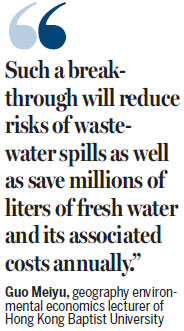HK startup may have hit on holy grail of fracking industry
Updated: 2015-11-11 08:03
By Timothy Chui in Hong Kong(HK Edition)
|
|||||||||
A 3-year-old Hong Kong startup believes it has solved one of the most expensive and controversial barriers to fracking - waste water purification.
The potential of Environtech Services Asia's novel waste water purification method is set to restart stalled oil shale exploitation on the mainland as well as revolutionize desalinization for ocean-going vessels, public water supplies and disaster relief.
Environtech, located at Hong Kong Science Park, has successfully combined an electrodialysis method with reverse osmosis - in a two-tiered desalinization process to purify and recycle polluted water.
Test results independently verified by ALS Technichem have shown the filtered water has purity rivaling that of fresh water, which typically has less than 1,000 milligrams per liter (mg/L) of total dissolved solids (TDS), while Environtech's most recently certified test results rated at 113 mg/L of TDS.
Opposition to fracking has largely centered on its enormous demand for clean water to help drive oil at surrounding injection sites toward a central production well through lateral pressure.
The process currently produces large volumes of waste water mixed with oil and other impurities, which is typically unfit for reuse.
The firm's water purifying technique pioneered by company Managing Director Hao Chhoa will allow oil companies to continuously reuse waste water, eliminating the need for constant resupply of pure water. Its filtration method - mating a low-voltage electrodialysis stage with conventional reverse osmosis filters - is much less energy-intensive, with energy demands expected to be 60 percent of current methods.

Such a breakthrough would reduce risks of waste-water spills as well as save millions of liters of fresh water and its associated costs annually, according to Hong Kong Baptist University geography environmental economics lecturer Guo Meiyu.
The technique can also be commercially applied for economical waste-water recovery to help deal with the fast-growing demand for drinking water in developing regions.
But Hao is keen on committing the new technique to the "Belt and Road" initiative, chiefly in the sustainable exploitation of the world's largest oil shale reserves located in China - in the western territories in and around the Xinjiang Uyghur autonomous region.
Ambitious targets for China's oil shale exploitation have been cut in recent years, from a target of 100 billion cubic meters of natural gas by 2020 to 39 billion cubic meters, largely because of disappointing test wells and a precipitous drop in oil and gas prices rendering fracking economically unsustainable, according to Chinese University of Hong Kong's Department of Geography and Resource Management Professor Xu Yuan.
Xu said a cheaper alternative for treating industrial waste water, a process hundreds of times more expensive than converting sea water into drinking water, would result in significant cost savings with the potential to make fracking economically viable during times of low oil prices.
Environtech Business Development Manager James Poon added their invention has already attracted interested from the central government, as well as prominent mainland universities and investors in Europe.
Environtech will be exhibiting its prototypes at the China Hi-Tech Fair in Shenzhen until Nov 21.
tim@chinadailyhk.com
(HK Edition 11/11/2015 page7)